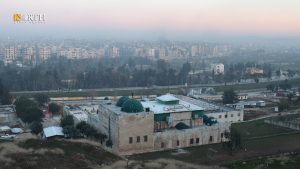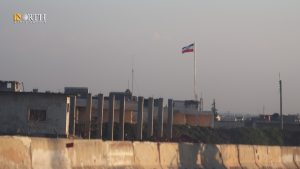By Muhammad al-Qadi
ALEPPO, Syria (North Press) – Residents of Aleppo Governorate, northwestern Syria, grow more concerned as the presence of Iranian-backed militias intensifies in its northern and southern countryside, particularly after the recent tension between Iran and Israel.
Residents’ fear potential attacks on posts of Iranian-backed militias within populated neighborhoods such as Sukari, Fardos, Salheen, Marjeh, and Bab Nayrab in Aleppo.
Enhancing presence
Ra’ouf Ali, a lawyer and political analyst from Aleppo, told North Press that Iranian expansion started by legally acquiring houses in regulated areas and seizing others in slums.
Ali further said that Iran’s so-called “advisors” in Syria are in reality serving Iranian interests in expanding its economic influence, and changing the demographics of the area by bringing in more Iran loyalists to areas that have increasingly taken on a Shia character in parts of eastern Aleppo and its southern countryside.
Hassan al-Zayiat, a pseudonym for a interpreter working with Iranian militants, told North Press the number of Iran-backed militias that entered Aleppo in 2014 was very limited, and under the leadership of Haj Jawad.
The words like “Haj” are pseudonyms that refer to Iranian-linked leaders in Syria. By 2019, more than 900 individuals, including clerics and engineers with various tasks, al-Zayiat said.
He added when the Syrian armed opposition was present in Aleppo, the Iranian presence was initially limited to the military academy in the southwest of the city, in addition to protecting al-Nuqta Mosque in the al-Iza’a area, as well as an arms warehouse in the Zahabiya area in the south of the city.
Al-Ziyat points out that after the withdrawal of the armed opposition at the end of 2016, the Iranian-backed militias began to relocate in the city under a new name, the “Aleppo Defenders Legion.” This Legion, led by Haj Mohsen, ceased its operations in 2020 after completing its mission, which was to establish posts in Aleppo and its countryside under various designations, including summer clubs and influence areas, directly affiliated with the Iranian command.
Repositioning
Al-Ziyat says that some Iranian leaders evacuated their residential areas, which Iran had acquired by purchasing a number of properties near al-Nuqta Mosque in the al-Iza’a neighborhood, causing fear among the residents.
Al-Iza’a neighborhood is considered one of the high grounds in the city, overlooking al-Nuqta Mosque, which is a shrine and worship place for the Shia sect. The people in charge of the Mosque have worked on buying all the surrounding properties that were put up for sale after the war.
Al-Ziyat indicates that Iranians were present in a four-story building that they acquired in the al-Muhafaza neighborhood several months ago. It is located near Branch 322, affiliated with General Intelligence Directorate of the Syrian government forces in Aleppo.
He adds that the place could not accommodate all the individuals working in the city, which led many of them to stay at the Sheraton and the Shahba Hotel in Aleppo.
Roots of concerns
Israel targeted a residential building near an Iranian-linked post in the southern countryside of Aleppo, leading to the killing of a family, a man, his wife and child. This incident prompted numerous residents residing near Iranian posts in the countryside to evacuate their homes.
Amjad Hamada, 40, a resident in the al-Iza’a neighborhood in Aleppo, says Iranian posts or houses are more likely to be targeted and he experiences great fear from time to time, especially when attacks occur.
Hamada added that the residents of the city of Aleppo, similar to other areas in Syria experiencing Iranian influence, are apprehensive about the city’s future and stability. The conflict between the Syrian government and the opposition has transformed into an arena to resolve international disputes, where Syrians pay the price for the presence of Iran, according to Hamada.
He indicates that to protect the population and alleviate their concerns, the focus must be on finding a regional political solution to the tensions between Iran and Israel and the Arab States rejecting their presence in Syria and other regions.
The Iranian-backed militias have more than 150 military posts, including weapon depots, checkpoints, and command centers, in eastern neighborhoods of Aleppo and its northern and southern countryside, in addition to the Iranian consulate.



